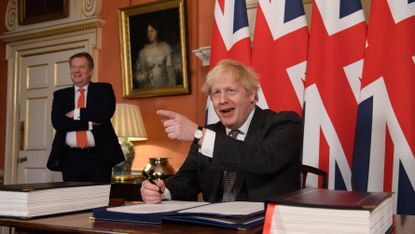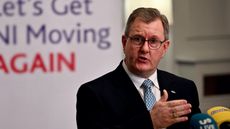The issue of the Northern Ireland Protocol explained
The EU and UK may be close to reaching a breakthrough deal on fraught post-Brexit customs arrangements

The UK and EU are reportedly close to a breakthrough agreement on customs that could mean an end to years of “post-Brexit wrangling” over Northern Ireland.
The Times reported this week that Brussels had accepted a proposal that would “avoid the need for routine checks on products destined” for Northern Ireland.
The paper also said that the EU had “conceded for the first time” on a key issue to do with the oversight the European Courts of Justice (ECJ) would have over the region. It said negotiators had agreed the ECJ could rule on issues related to Northern Ireland only if a case was referred by Northern Ireland's courts, instead of – as the EU had previously insisted – that the European Commission should be able to take cases straight to court.
Subscribe to The Week
Escape your echo chamber. Get the facts behind the news, plus analysis from multiple perspectives.

Sign up for The Week's Free Newsletters
From our morning news briefing to a weekly Good News Newsletter, get the best of The Week delivered directly to your inbox.
From our morning news briefing to a weekly Good News Newsletter, get the best of The Week delivered directly to your inbox.
However, the BBC has reported that EU officials have “dismissed” such claims over a deal on the ECJ’s role in Northern Ireland. Two people close to the talks “pushed back hard against the report” with one describing it as “kite-flying” by someone in London.
The latest
The deal would mark a “critical step”, according to The Times, towards ending the impasse over the Northern Ireland protocol, which has been a sticking point in post-Brexit arrangements since they came into effect two years ago.
On trading arrangements, the Financial Times reported that those close to the talks believe a deal is “getting close”, and negotiators have briefed prime minister Rishi Sunak that a deal could be taking shape to resolve the dispute.
But Sunak will face a “big test of his authority as he agonises over whether he can sell an outline deal” to Eurosceptic Tory MPs and unionist politicians in Northern Ireland, said the FT. Eurosceptic MPs have warned they “would not accept any deal that left the European Court of Justice with any role in UK territory” amid reports that British officials could be prepared to accept some continued role for the ECJ in Northern Ireland.
Sign up for Today's Best Articles in your inbox
A free daily email with the biggest news stories of the day – and the best features from TheWeek.com
Both the UK and the EU told the BBC that significant “challenges” remained over reaching an overall agreement, but that talks were ongoing on potential solutions, including over goods. A spokesperson for the UK government said “intensive scoping discussions” were taking place.
What is the Northern Ireland Protocol?
The Northern Ireland Protocol was agreed as part of the Brexit deal signed by Boris Johnson in December 2020 and is designed to protect the Good Friday Agreement by avoiding a hard border on the island of Ireland.
The protocol, which came into force in January 2021, works by keeping Northern Ireland inside the EU’s single market for goods. Therefore, Northern Ireland continues to follow some EU laws and there are new checks and paperwork for goods, which are imported into Northern Ireland from the rest of the UK.
Some goods, including chilled meats and plants, were technically banned under the deal because such products cannot be imported into the EU from outside the bloc.
What is wrong with it?
The protocol is “threatening to derail the new Stormont power-sharing government”, said The Guardian, “after the Democratic Unionist party refused to appoint new ministers until the checks on the Irish Sea border on goods coming into Northern Ireland from Great Britain were scrapped”.
Following the threats by unionists to boycott power-sharing in the province until the deal was reformed, Johnson said that the protocol was “not sustainable in its current form”.
Aside from the politics, the DUP argues that it is damaging Northern Ireland's economy and is causing major disruption for businesses.
What is being discussed?
Any deal between the two sides ultimately rests on whether the agreement can “reduce the levels of checks at the Irish Sea trade border to manageable levels and resolve the role of the European Court of Justice in enforcing the protocol”, explained the Financial Times.
The paper reported that those close to the negotiations have said that the EU has agreed “in principle” to a system of “red and green lanes” to reduce the need for checks on goods travelling from Great Britain to Northern Ireland, “but that discussions were continuing over crucial details covering the scope and operation of the lanes”.
Goods crossing the Irish sea which were intended for sale on UK soil in Northern Ireland would go through a green lane which had reduced physical checks, supported by “real-time customs data”. Goods destined for the EU and the Republic of Ireland would enter a red lane and be subjected to full customs and regulatory checks.
The FT said that “all the outstanding areas of discussion between the two sides were still under review, including VAT rules, customs, state aid, the role of the ECJ and the terms of operation for the ‘red and green’ lanes”, per an internal briefing of EU diplomats in Brussels last week.
What does the EU want?
The EU has acknowledged that there are problems with the protocol, but has so far demanded a more limited set of exemptions and changes than the UK.
It has suggested changing EU law to allow medicines made in Britain to continue to be supplied to Northern Ireland and addressing the ban on the export of sausages to Northern Ireland by allowing products that play a part in the “national identity” of communities there.
However, the EU has insisted that the ECJ must still “ultimately police” the Northern Ireland Protocol and it says there should be no blanket exemptions on checks in the Irish Sea.
Create an account with the same email registered to your subscription to unlock access.
Sorcha Bradley is a writer at The Week and a regular on “The Week Unwrapped” podcast. She worked at The Week magazine for a year and a half before taking up her current role with the digital team, where she mostly covers UK current affairs and politics. Before joining The Week, Sorcha worked at slow-news start-up Tortoise Media. She has also written for Sky News, The Sunday Times, the London Evening Standard and Grazia magazine, among other publications. She has a master’s in newspaper journalism from City, University of London, where she specialised in political journalism.
-
 Who actually needs life insurance?
Who actually needs life insurance?The Explainer If you have kids or are worried about passing on debt, the added security may be worth it
By Becca Stanek, The Week US Published
-
 Sexual wellness trends to know, from products and therapies to retreats and hotels
Sexual wellness trends to know, from products and therapies to retreats and hotelsThe Week Recommends Talking about pleasure and sexual health is becoming less taboo
By Theara Coleman, The Week US Published
-
 Is the AI bubble deflating?
Is the AI bubble deflating?Today's Big Question Growing skepticism and high costs prompt reconsideration
By Joel Mathis, The Week US Published
-
 Will Aukus pact survive a second Trump presidency?
Will Aukus pact survive a second Trump presidency?Today's Big Question US, UK and Australia seek to expand 'game-changer' defence partnership ahead of Republican's possible return to White House
By Sorcha Bradley, The Week UK Published
-
 It's the economy, Sunak: has 'Rishession' halted Tory fightback?
It's the economy, Sunak: has 'Rishession' halted Tory fightback?Today's Big Question PM's pledge to deliver economic growth is 'in tatters' as stagnation and falling living standards threaten Tory election wipeout
By Harriet Marsden, The Week UK Published
-
 Stormont power-sharing in sight: 'good news' for Northern Ireland?
Stormont power-sharing in sight: 'good news' for Northern Ireland?Talking Point Unionists vote to end two-year boycott after agreeing legislative package to address post-Brexit trading arrangements
By The Week UK Published
-
 Why your local council may be going bust
Why your local council may be going bustThe Explainer Across England, local councils are suffering from grave financial problems
By The Week UK Published
-
 Rishi Sunak and the right-wing press: heading for divorce?
Rishi Sunak and the right-wing press: heading for divorce?Talking Point The Telegraph launches 'assault' on PM just as many Tory MPs are contemplating losing their seats
By Keumars Afifi-Sabet, The Week UK Published
-
 How would a second Trump presidency affect Britain?
How would a second Trump presidency affect Britain?Today's Big Question Re-election of Republican frontrunner could threaten UK security, warns former head of secret service
By Harriet Marsden, The Week UK Published
-
 'Rwanda plan is less a deterrent and more a bluff'
'Rwanda plan is less a deterrent and more a bluff'Instant Opinion Opinion, comment and editorials of the day
By The Week UK Published
-
 How the biggest election year in history might play out
How the biggest election year in history might play outThe Explainer Votes in world's biggest democracies, as well as its most 'despotic' and 'stressed' countries, face threats of violence and suppression
By Harriet Marsden, The Week UK Published